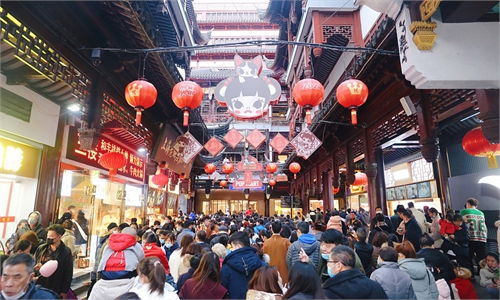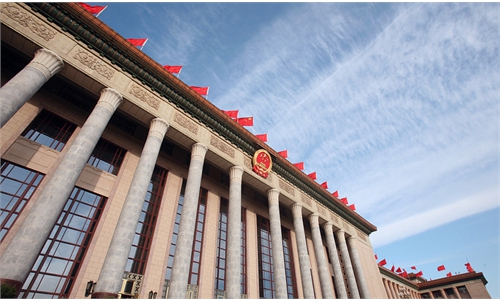Visitors pose for a selfie with Chinese national flags in front of the Great Hall of the People in Beijing. The hall will host several events at the annual two sessions, including the plenary meetings of China's top legislative body and political advisory body. Photo: IC
On the eve of China's annual gathering of political advisors, part of the hotly watched two sessions, executives at some major foreign firms that have been hinging growth on their China success consider the weeklong event as making the case for optimism in the face of uncertainty.
The Chinese People's Political Consultative Conference (CPPCC), the country's top political advisory body, will highlight the 14th Five-Year Plan (2021-25) and other key political and economic topics at its annual gathering, scheduled to last for six-and-a-half days, from Thursday till March 10, Guo Weimin, spokesperson for the fourth session of the 13th National Committee of the CPPCC, told a press conference in Beijing on Wednesday.
Some CPPCC members have called for government regulations to be more scientific, professional and regular to allow foreign companies to enjoy China's opening-up policies in a comprehensive manner, offsetting uncertainty in the international business environment with certainty in China's domestic business environment, Guo stated.
China was the only major economy to grow in 2020, with its GDP standing at 101.6 trillion yuan ($15.67 trillion), up 2 percent over the previous year. This was only one of the most significant examples of how China has been able to win key battles in its path to become a moderately prosperous society outlined in the 14th Five-Year Plan, as well as the long-range objectives through the year 2035, Zhou Bing, vice president of government affairs for greater China at Dell Technologies, told the Global Times on Wednesday.
Describing the US technology giant as an enabler of building a digital future for organizations and individuals, and transforming how they work, live and play, Zhou said that "we are fully confident in China's economic growth and we will continue to execute our 'In China, For China' Dell China 4.0+ strategy to continue our contribution to the development of the Chinese economy."
"With our full commitment to the Chinese economy, we will help accelerate the digital transformation of our customers in China by continuously providing our Chinese customers with the industry's broadest and most innovative technology and services portfolio for the data era."
Pang Xingjian, senior vice president of Schneider Electric, said that the company looks forward to more feasible proposals during the 2021 two sessions on the digital economy's development.
According to Pang, the French firm is happy to see that many suggestions and proposals have emerged on how to push for a high-quality digital economy during the two sessions, and that the Chinese government has expressed an inclination to integrate the real and digital economies.
"For companies like us, this has not only defined our future business direction, but has set our mind at ease about expanding investment in the digital economy in the future," Pang said in a statement sent to the Global Times.
According to Pang, Schneider Electric will further expand the integration between new technology and industrial application scenarios, and will help industries speed up their digital transformations.
Pang also said the company will continue to provide solutions to Chinese clients to help them undertake business transitions as the country approaches its carbon emissions peak.
It is believed that carbon neutrality will be a focus of this year's two sessions, as China has set a goal of hitting peak carbon emissions before 2030 and achieving carbon neutrality by the end of 2060.
Fabrice Megarbane, president of L'Oréal's North Asia zone, said that the company particularly looked forward to the government's ambitious plans on innovation-driven development and green development in China's 14th Five-Year Plan and 2035 long-term development goals, as well as the upcoming legislative and political advisory meetings.
Megarbane noted that as China continues to cultivate good consumption, the company was "thrilled" that the government is encouraging a green recovery and championing sustainability to create a green ecosystem.
"L'Oréal China is leading the sustainability effort, as China was our first market worldwide to achieve carbon-neutrality in all operating facilities and our first market in APAC to build a water-loop factory. This is something we strongly support and a transition to which L'Oréal is absolutely committed," Megarbane said.
"As the pace of reform in recent years has sped up, its execution has become more efficient, and China has opened its doors even wider. The more the business environment improves, the more confidence we have in the Chinese market. China is not only set to become the world's largest economy and L'Oréal's biggest market - it is the 'laboratory' of the future."
He said that L'Oréal is deeply impressed by the speed, efficacy and pragmatism of the Chinese government in helping businesses operate through the coronavirus pandemic.
"Thanks to government incentives and the resilience of its people, consumption in China has rebounded quickly and strongly, laying a solid foundation for L'Oréal's business recovery. This reaffirms our belief that nothing can stop Chinese people in their pursuit of a better life," he said.
Unfazed by the onslaught of the pandemic, China unseated the US as the world's largest recipient of foreign direct investment (FDI) in 2020, the UN Conference on Trade and Development revealed in a report in January.
China bucked an overall recession to receive $163 billion in inflows last year, while the reading for the US came in at $134 billion.
In 2019, the US posted $251 billion in FDI inflows while China received $140 billion.
Global FDI plummeted 42 percent in 2020 to an estimated $859 billion, per the report.
In an assurance of the country's continuing role as a magnet for foreign investment, Paul Huang, senior vice president of the LEGO Group and general manager of LEGO China, said that the LEGO Group has had a long-term plan for the market, and sees China as an important strategic market.
"We plan to open 80 new LEGO-branded retail stores in the Chinese mainland in 2021, which means we will have about 300 such stores in more than 80 cities by the end of this year in China," Huang said.
"We will continue to invest in retail expansion, brand building and IP protection and sustainability in China," he noted.
According to Huang, the LEGO Group is looking to establish an all-dimensional ecosystem in China including online shops, physical retail stores and LEGO education centers.
He noted that the company has launched products and play theme inspired by Chinese culture and values, to bring the LEGO play closer to the heart of Chinese consumers and support the children with learning through play.



